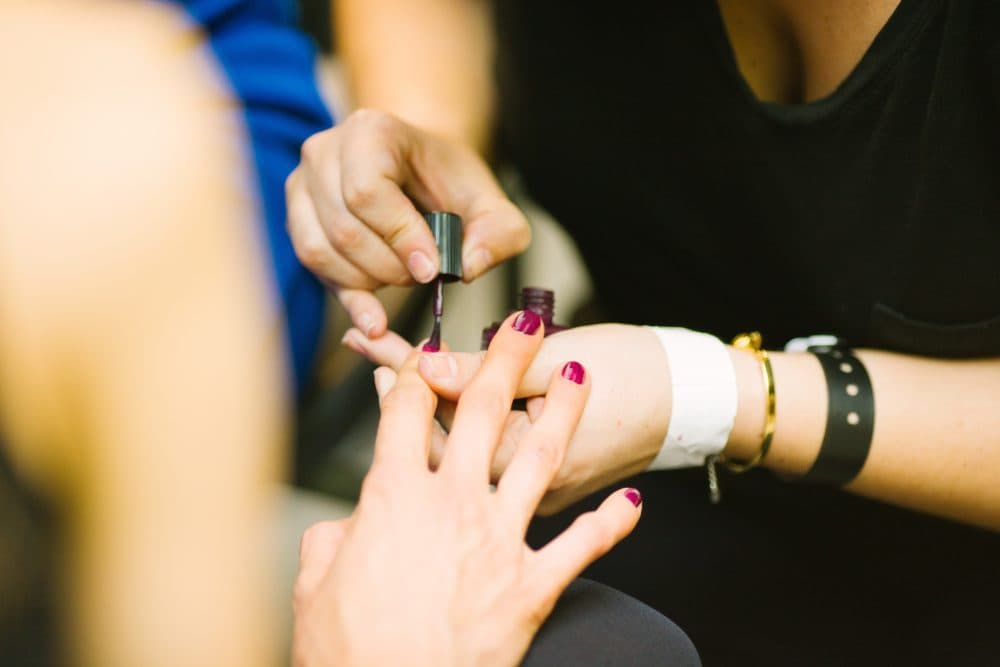Advertisement
A Trip To The Nail Salon, A Lesson On America

COMMENTARY
I had my first — and until recently, only — professional manicure about 25 years ago, when my daughters wanted adorned nails for their birthdays and I clearly wasn’t up to the task. I decided to make it into an outing, an act of compensation for my resistance to buying the Barbie dolls they also desperately wanted.
I don’t remember if they were pleased with the experience or the outcome; I just remember that I was traumatized by all the snipping and filing, the jamming of cuticles and array of devices that looked too much like dental instruments. And, of course, I was shamed by the grimacing disapproval on the face of the woman who was silently torturing me for my own good.
I thought that, like riding Space Mountain with my daughter — a spectacular ordeal for someone like me who hates roller coasters — having subjected myself to a manicure once, I need never go back.
It’s not that I’m without vanity. I spend a fortune on hair care products. Facial hair (my own, that is) makes me berserk. But shoes, clothes, make-up — I’ve just never cared enough to want to invest my energy or earnings in them. And the manicure — I’ve always thought of it as the optimized trifecta of sins — chemically toxic, objectifying and oh-so-temporary.
But two weeks ago, preparing for my niece’s wedding, I decided to go all out. And so, at the age of 62, I went to a nail salon in Harvard Square for the second manicure of my life. The trip proved to be more than an indulgence. It was a lesson in interdependence, a timely illustration of how intimately and essentially our everyday lives are enhanced by the many immigrant subgroups within our larger community.
The trip proved to be more than an indulgence. It was a lesson in interdependence, a timely illustration of how intimately and essentially our everyday lives are enhanced by the many immigrant subgroups within our larger community.
Stepping into the salon, I felt as I did when landing in Bangkok. It was like going to Thailand, but colder. I towered over the many women of Southeast Asian descent staffing the place, but was, for all intents and purposes, a giant infant. I needed them to instruct me in proper protocol.
The menu of services was baffling to a beauty tourist like me. Did I want a gel manicure, a French manicure, French tips? The etiquette was equally elusive. Was I supposed to point to the color I liked from the many, many bottles of nail polish arrayed on an overwhelming number of back-lit shelves, or simply remove the object of my desire? And how many objects should I desire? One color or two? A trio of women pointed, guided and steered me from station to station. They snipped, filed, buffed and lacquered me, effectively advising me with gestures, pictures and a handful of English words (which was a handful more than the number of Thai words in my vocabulary). In that salon, I was a stranger in a colorful, aromatic land, dependent on the kindness of its inhabitants.
Advertisement
That nail salon is just one of the many immigrant enclaves in the service economy. The restaurants surrounding it are Korean, Japanese, Vietnamese or Mexican. The garage across the street is staffed largely by an extended family of Ethiopian women. The gas station down the block has been manned for years by Syrian immigrants. The old houses on the adjoining streets have roofs replaced by a crack team of Dominican roofers, exterior walls painted by crews of Irish painters, interior ones by Brazilians and the soft pine floors refinished by a one of the many small companies of Vietnamese floor sanders.
The manicure occupied just one hour of my life, but it was an hour enabled and enriched by the energy, resourcefulness and competence of immigrants.
The manicure occupied just one hour of my life, but it was an hour enabled and enriched by the energy, resourcefulness and competence of immigrants. They do the work that many native-born Americans shun, all the while breathing in the chemicals, dust and fumes that may well shorten their demanding lives.
So almost despite myself, this turns out to be not a puff piece, but a column about women’s liberation, immigration and environmentalism because the freedom, mobility and the health of the planet we all inhabit aren’t just discrete and potentially annoying political topics. They’re human needs embodied in the people whose lives and labor are woven into the fabric of our everyday routines.
That invaluable reminder lives on in the once glossy, now chipped, crimson nails of the fingers typing these words.
